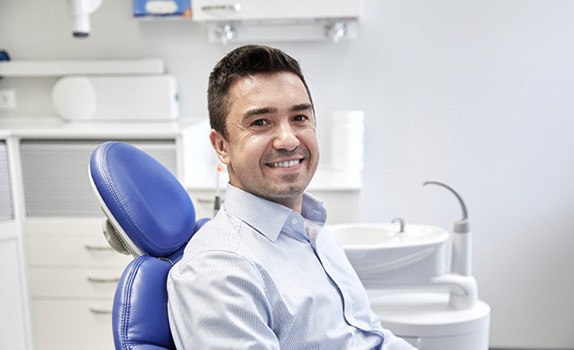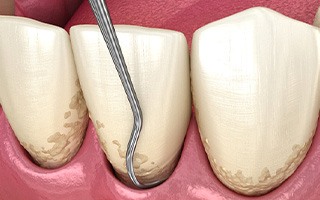Gum Disease Treatment – Rockwall, TX
Protecting Your Smile’s Foundation
Did you know that gum disease is the leading cause of tooth loss around the world? Did you also know that around 50% of U.S. adults have it right now? If you or someone in your household is dealing with red, swollen, or bleeding gums, these are the early signs of an infection that could cause lasting damage without professional intervention. Fortunately, our team at Spillman Family Dental of Rockwall can help put a stop to gum disease before it’s too late. If any of the symptoms we touched on above sound familiar, don’t wait to give us a call and schedule an appointment for gum disease treatment in Rockwall.

Why Choose Spillman Family Dental of Rockwall for Gum Disease Treatment?
- Thorough Gum Screenings at Every Checkup
- Every Patient Receives Plenty of 1-on-1 Attention
- Soothing Sedation Calms Any Dental Nerves
What is Gum Disease?

Afflicting roughly half of the American population, gum disease is characterized by an infection and inflammation of the gums, often stemming from inadequate oral hygiene. The accumulation of plaque and bacteria along the gumline can result in infection, presenting various symptoms and potential complications if not addressed promptly. Yet, during its initial phases, gum disease is entirely reversible before the infection advances further.
Symptoms of Gum Disease

During your upcoming checkup, our team will examine your mouth for indications of gum disease. However, certain symptoms may be observable on your own, including:
- Gums appearing redder or more swollen than usual
- Bleeding during brushing or flossing
- Noticeable elongation of teeth, often associated with gum recession
- Alterations in the way teeth fit together
- Loosening of permanent teeth
How Do We Treat Gum Disease?

The recommended treatment for gum disease will depend entirely on the severity of your current condition. Following a thorough examination of your oral health, our team will guide you through the available options, explaining the most suitable approach tailored to your specific situation.
Scaling & Root Planing

After evaluating your gum disease, we may determine that scaling and root planing are required. Scaling and root planing are the two steps of a deep cleaning, which is often necessary once your gum disease has become advanced enough. The goal will be to get rid of the plaque and tartar in your mouth (particularly in the hard-to-reach area between your teeth and gums) while also taking steps that will reduce the risk of further infection.
Do I Need Scaling & Root Planing?

Ultimately, whether you need scaling and root planing depends on how severe your gum disease is. When the condition is still in its earliest stages, more conservative solutions – such as an improved oral hygiene routine – may still be viable. However, after a certain point, scaling and root planing might be your best option.
If you haven’t already been diagnosed with gum disease, you should keep an eye out for the following symptoms:
- Easily bleeding gums.
- Swollen and/or red gums.
- Constant halitosis (bad breath).
- Gum recession.
The warning signs listed above could mean that scaling and root planing are necessary, so reach out to our office right away to let us know about the problems that are going on inside your mouth.
The Process of Scaling & Root Planing

To prevent discomfort during your treatment, we will numb your mouth. There may be some pressure while we’re working with your gums and teeth, but there shouldn’t be any pain.
Once we’re sure that you’re comfortable, we will begin the scaling phase. We’ll locate the areas where plaque and tartar have built up so that we can remove them. Unlike traditional dental cleanings, scaling largely focuses on the area beneath your gumline.
After scaling comes root planing. This involves taking the roots of the teeth and gently smoothing them out. Bacteria have a harder time building up on smoother surfaces, so this step will help protect you from further gum disease. Also, it will be easier for your gums to adhere to the teeth again if there’s a smooth surface for them to attach to.
Aftercare Tips for Scaling & Root Planing

Trying to eat while your mouth is still numb could result in accidentally biting your tongue, so plan not to eat anything for at least a couple of hours after your scaling and root planing. If your mouth is sore, you can soothe it by rinsing with salt water every few hours. You will need to only eat soft foods for at least a couple of days while your mouth is recovering.
Our team will give you tips for protecting your smile from infection while your mouth is still healing. Be sure to be diligent about taking care of your teeth and gums; you can brush and floss like you normally would, but you will need to be gentle in the areas where scaling and root planing were performed.
